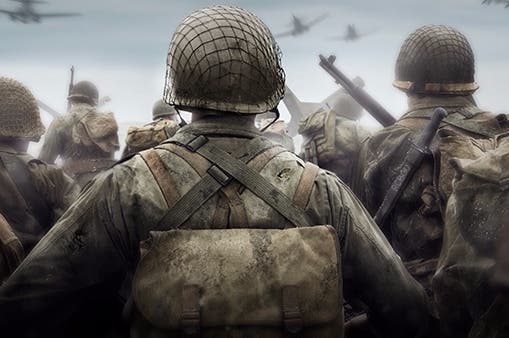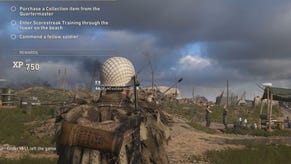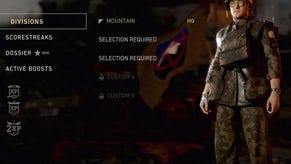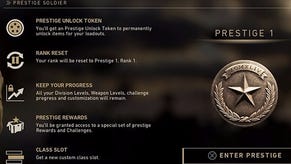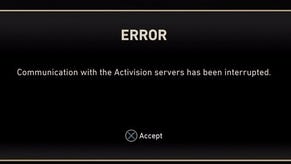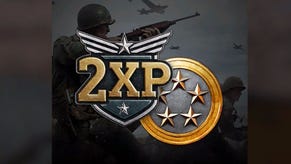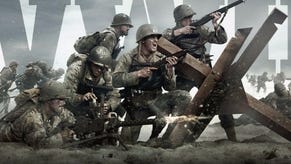Little things save Call of Duty: WW2 when the big things fail to make an impact
Mornin', soldier.
This piece contains major spoilers for Call of Duty: WW2's campaign.
Mitterrand's last meal sounds like a riot - an ugly, vengeful riot conducted, if riots are a class of thing that can be conducted, against life itself. There were oysters, then there was foie gras, and then there was capon. Michael Paterniti, restaging this grim feast several years after the president's death, while writing a gloriously dark and searching piece titled The Last Meal, reveals that it was the work of four hours just to get through all that - through the oysters, the foie gras, the capon, the wine.
But the best was still to come - and the worst. The final course of Mitterrand's final dinner was ortolan, a tiny songbird that it is intermittently illegal to eat in France where, according to Paterniti, it "supposedly represent[s] the French soul." In preparation for dinner, the ortolans are "drowned in Armagnac and then plucked of their feathers." They are peppered and roasted in their own fat. You eat them whole.
And the taste? Well even before that there's the sound, for starters, "the crunch and pop of bone and tendon." Then there's the heat. And only then is there the "exploding juices - liver, kidneys, lungs. Chestnut, corn, salt". It is a small thing, an ortolan. But it seems that it is a big thing to eat one. Diners traditionally place a white cloth over their heads so that God will not see them at it.
No ortolans were consumed in the making of Call of Duty: WW2, I suspect, but one is certainly invoked at a crucial moment. A tense scene: night in occupied Paris, and I am staring into the eyes of the high-ranking Nazi who killed my family. I am trying to work out whether my cover has been blown, whether he knows that I am here to finish him off and kickstart the liberation of the city. He is being sent back to the Fatherland, he tells me. He's happy about it - the French deserve each other. But he'll miss the cuisine, of course. Ha ha! He'll miss those ortolans, wink-wink. And I know what he means. The crunch and the pop. The heat. The exploding juices. What a monster!
A classy touch, I reckon, even as events lurch out of control and I'm into a quicktime event - oh, COD - and then a prolonged back-and-forth gun battle that leads out of the building, into the streets, and then back into the building again. This whole sequence, the cold-blooded middle act of the game, has been something of a demonstration of restraint by the usual standards of a COD campaign. You are undercover, infiltrating an enemy HQ in occupied territory and seeking your contact without revealing your true identity. But because it is COD, of course, the restraint itself is somehow lavish.
Lavish restraint! The ostentatious absence of a gun. The many varied moments tempting you to out yourself as a non-Nazi. The sheer needless detailing of the building you are exploring: waxy wooden floors, letters on desks that you can pick up and translate on the fly, the card game kicking off in the basement. When Paris is eventually liberated - and spoiler, it is - the French respond with fireworks. A lovely moment, because everyone ducks and cringes for a second as the first explosions light the sky. But doesn't COD respond to everything with fireworks? And is that part of the problem?
My sense throughout much of this breathless, generous, far-reaching single-player campaign is that, while fans are happy to see COD returning to World War 2, the developers may have had a worrying sense of what they were ultimately in for. A return to World War 2 would mean, with a certain thematic resonance, that they would be fighting on several fronts. They'd have to tell a coherent story about the war, sure, but they'd also be competing with the legacy of all those other games and movies that told stories about the war. And on the other side they'd be competing with the players' deep understanding of the conventions and cliches and tics and tricks of a COD campaign and how a COD campaign's designers traditionally like to do things. On top of that, fans - and execs, no doubt - want a 'greatest hits' package. Let's own the distastefulness of that phrase, all of us. They want the big notes struck and struck resoundingly. And COD: WW2 does that - but there is a feeling of sacrifice to some of it, a sacrifice in terms of surprise, in terms of freshness. The big moments do not always make as much of an impact as I expected. Luckily the small moments often do.
Let's talk about D-Day. A logical place to start for a campaign narrative that covers the retaking of Europe. It means that the story can follow a clear, if higgledy, spine of sorts as the troops drill a path from Normandy beaches through occupied - and then liberated - Paris and all the way into Germany. But D-Day has been done, hasn't it? In hundreds of games and in hundreds of films?
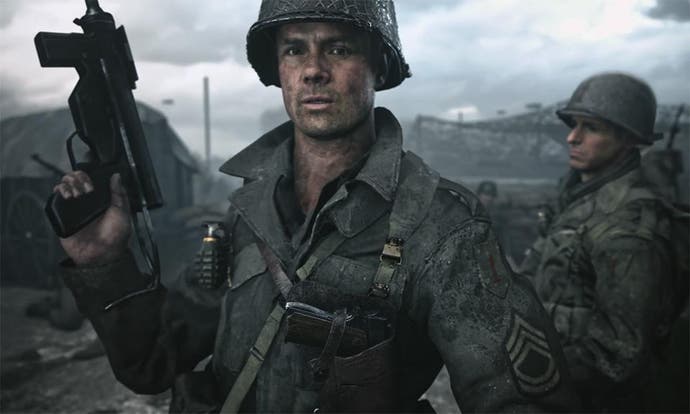
Not hundreds, actually. A quick google suggests it's not anywhere near as well-travelled as I had thought. But the reason it feels like hundreds of games and movies have had a run at D-Day is because the handful that did tended to give it the auteur treatment. D-Day, those troop ships, those grey, lashed and blasted beaches cause people to reach deep, to elevate their handling of the material. There are set-pieces in Medal of Honour and Company of Heroes, and, more than anything, those opening minutes in Saving Private Ryan, a brutally eloquent examination of war's sheer lack of eloquence, of its sense-pummeling reality and chaos.
That's what you want to capture, right? But the question with these kind of moments is how long? How long can the designers or the director keep it up? In the name of delivering the bludgeoning shock of war itself, war as something that happens to people rather than war as a means to a heroic end, Saving Private Ryan spent 24-odd minutes on D-Day. 24 minutes when you're shuddering in a seat in the cinema is quite a long time. It would be an absolute aeon when you have a controller in your hand. Battlefield 1, which did such a glorious job in terms of leading World War 1 away from the normal cliches and arguing that here was this crazy, monstrous steampunkish event in which the technology looked truly alien and the modern, mechanised world was suddenly lunging forward out of the mustard gas to announce itself? Battlefield 1 gives you about five minutes of bewilderment, if memory serves. You get that first astonishing mission in which you're always fighting and always dying, in which you can't tell who's a friend and who's an enemy, or what conceivable strategy this particular chunk of muddy, messy torture might be aiding. Then, you're into a tank and off on a series of clean and tidy seek-and-destroy missions, moving the tank, aiming the gun, firing, and even repairing stuff with a few taps of a few button, even though a cut-scene has literally just told you that tanks were as terrifying and alien as everything else, thanks, that they required a handful of people working in them, legs in each other people's laps, elbows in each other people's faces, and not one of these people had a full sense of what was truly going on inside or out.
COD: WW2's D-Day gives you somewhere between one minute and two minutes of pulverising carnage, as you emerge from your landing craft and then belly your way up the beach while gunfire rips into you. I died many times as I tried to work out how to survive in a seemingly unsurvivable environment. I was duly dazzled and disoriented and oppressed and shaken about. But then the wall is breached and I'm given a gun and I drop down into the trenches and there's a mission marker and I'm home. It's suddenly very clear where to go and what I have to do and who I should be shooting at and how well everything is unfolding around me. I'm still getting shot, but it's no longer killing me that quickly. Getting shot is actually a comfort too, because, argh, after all that chaos and random death, this is recognisably COD, where the chaos is all tautly-strung marionette wires and the randomness is provided by hundreds of virtual actors hitting their marks with supercomputer precision.
It's those two fronts closing in: the familiarity of Saving Private Ryan and the familiarity of COD and its systems, the way it likes to throw its shooting arcades together around you. D-Day is handled skilfully here in COD: WW2. There is artistry and heart and a palpable desire to make a sequence that resounds, that counts. But it didn't resound for me. It didn't surprise. It's big and loud but it doesn't make me see something afresh, it didn't deliver the sheer unthinkability of Normandy.
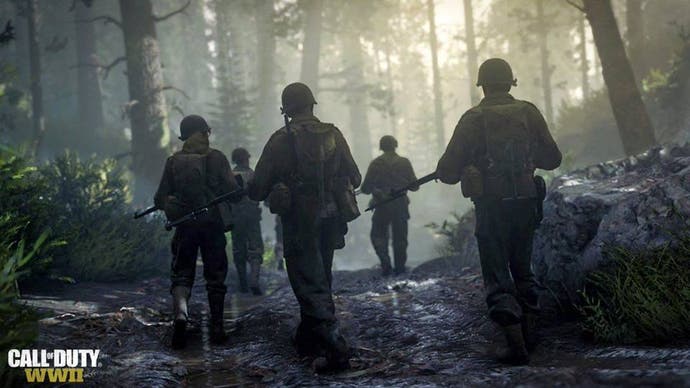
Is D-Day non-doable now? I don't know. I am reminded, though, of something William Goldman once wrote about when describing the period in which he laboured helplessly on the script for All the President's Men.
The problem with All the President's Men, according to Goldman, was that by the time this legendary film about Watergate came out, everybody was absolutely sick of Watergate. More than that, everybody thought they knew the story inside out. They were sick of it and bored by it all at the same time. So Goldman read everything he could and then he had an idea for the first scene: the break-in scene. Cars driving up in the darkness, shadowy men emerging. The building before them, sneaking inside, and then the door to the office they have come to ransack looms. Keys are produced. Keys go into the lock. And then: nothing. These men brought the wrong keys. So they have to go home again, and the audience, hopefully, realises that if this really happened (it did) maybe they did not know everything about Watergate after all.
In scriptwriting terms, this particular move is called a reversal - as in a reversal of expectations - and Goldman is the absolute master of it. COD could have done this, to a certain degree, with D-Day, although I am always deeply uneasy, as I absolutely should be, when it comes to suggesting how smart people may have liked to have done something differently after the fact. But it strikes me that there is a way to get the defining stuff of D-Day and the horror and the violence and also leave people wrong-footed, leave them with a sense that here are the greatest hits, yes, but maybe they do not know the greatest hits as well as they think they do. Maybe there is a layer of human truth they have missed until now.
The troop carriers. The grey seas. The emplacements, the uninviting stretch of sand. And then attack from German E-boats as the men prepare to take the beach. Bullets everywhere in the air, chaos, men drowning, and all of this, all of this horror and death taking place off the coast of Slapton Sands in Devon: a D-Day rehearsal that turned out to be so botched and so deadly that the government tried to keep it a secret for decades.
Even if Sledgehammer had found a way to twist the sequence into something surprising, D-Day in COD: WW2 still reveals a problem with a lot of the big moments in this game, artful and, yes, weirdly, blasphemously enjoyable as they are. When you're constantly being shot at - when a developer is delivering war on a certain scale and intensity - being shot at loses its impact. This is not the same punishing onslaught of the D-Day landings as handled in Saving Private Ryan, I would argue, because players can tell that it's not deployed in the service of theme. Rather it's the relentless effect of relentless chug, the need to keep you in the thick of action as much as possible because that's the pitch, and that's the promise.
This makes COD's quieter moments extremely effective - the undercover mission in Paris is already the sort of thing people are talking about as a stand-out because it delivers a more intimate kind of tension, and a more human-scale tension. I'm not sure games can do war, because I don't imagine anything can really capture that kind of sustained horror and sustained boredom that I have at least read about as being war's defining qualities. But games can do this stuff very well: a bunch of people in a bunch of rooms, quietly pursuing their own agendas.
And looking back on the campaign, it's these things that stand out: the small things, or the quiet things, or the things, even in the midst the action, that made me stop and think in a way I was not expecting. I think of hunting through the basement in a ruined hotel, looking for the last German civilian caught up in the fighting, and then the moment where I had to lead her back to safety while bullets flew all around me. Nothing quiet about this one, but my attention was deeply focused on something small and vital, and the emotions were, oddly, emotions I can easily relate to: panic and confusion and the sense of tapdancing on the edge of failure. The drama is still mortal, but it is also human-sized.
Elsewhere, a single glimpse: an airman hanging dead from a burning tree, and you think, some letter home would have had to explain this, will have had to provide a normalising context for this strange death and all the others. Elsewhere, a brisk morning walk through friendly territory with a simple mission: to take breakfast to a lookout. I pass people on the way: "Mornin', soldier," they say. "Mornin'," I reply.
Elsewhere, placing a box of ammo under a makeshift Christmas tree. Elsewhere, playing Where the Woozle Wasn't with a heavily-armoured German tank, I spin past the remains of a shattered townhouse and see a perfectly dandy pink sofa perched on a few spars of splintered floorboards: the sort of sofa you would be told endlessly to keep your muddy boots away from. Elsewhere, that high-ranking Nazi who told me how much he would miss eating ortolans before he tried to strangle me. Elsewhere, the absolute stand-out moment - the most awful moment in the whole campaign and it was a total accident - where I killed a German soldier who was trying to surrender, simply because I got flustered and pulled the wrong trigger on the controller.
I have never been in a war, and I hope I never have to be. But this year's COD made it clearer than ever to me that a game cannot show you what war is like, and that the closer it gets in terms of fidelity of image and the number of moving pieces, the more apparent this gap becomes. This has almost become the theme of this particular game for me, the unavoidable fraudulence of making games about history. The first bullet that hits you is never just a warning, and your colleagues in the heat of the action are unlikely to cheerily yell out "I got a medpack waiting for ya!", or words to that effect.
So what is new, right? What's new is this glimpse of a way of talking about war that goes beyond the greatest hits, of summoning a sense of history in the little things, the smaller, sometimes entirely quiet moments: the telling details, the nuances, the reversals. That runaway German train was pretty exciting, for sure. That tumble down the belltower was a beauty to look at. And granted, I do like the way the focus steadily shifts from the big beats of the war to the smaller beats of the guys in my platoon as we head deeper into Germany. But I remember the guy I didn't mean to kill, and the other guy who was just waiting for breakfast in the lonely cold. Most of all I remember the crunch and pop of that tiny yellow bird.
